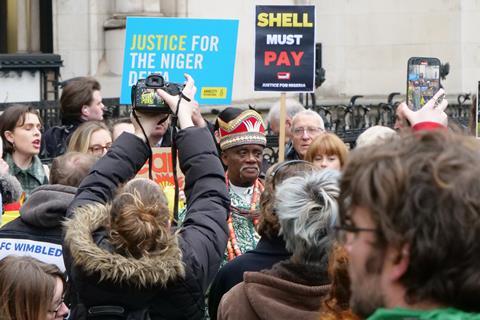The High Court is this week hearing issues of Nigerian law ahead of a full trial over liability for pollution caused by oil spills in the Niger Delta region.
The claimants in the action, the Bille and Ogale communites, seek injunctive relief from oil giant Shell to carry out remediation, as well as so-far unspecified damages. Shell denies liability, arguing it cannot be liable for damage caused by third-party interference with its pipelines.
The preliminary issues trial, before Mrs Justice May, centres on issues of Nigerian law. The full trial is listed for 2026.
Opening for the claimants, Anneliese Day KC noted that the defendants had accepted the region 'has experienced significant oil pollution and this pollution has harmed the environment'. She added: 'We say it is important not to lose sight of that as we delve into the detail of the legal arrangements.’
The court heard that the judge must rule on the preliminary issues on the basis of what the Supreme Court of Nigeria would decide. Day added: ‘There is not a shortcut through this litigation because it will depend on the facts.’
Each party has created a list of the preliminary issues with key authorities and the ‘answer that should be given to each of these preliminary issues’.

Read more
Day added that the claimants were not seeking to find the defendants liable for third party acts but ‘rather for the consequences of the defendants’ own conduct…a very very important distinction and one that needs to be clear from the outset’. She told the court the ‘failure to protect the defendants' assets gave rise to damage’.
‘The primary question is the first one, where there are multiple sources of pollution or environmental damage, what is the applicable test for causation under Nigerian law?’
Experts for both parties will be giving evidence in relation to Nigerian law.
James Willan KC, for Shell, told the court that Nigerian Court of Appeal judges and their decisions are ‘likely to be far better…weather vanes’ for deciding how the Supreme Court would decide on issues in the case.
Speaking of the obligation to protect in [Nigeria's] Oil Pipelines Act 1956, concerned with whether there is a duty on the licence holder to take steps to prevent acts of third-party interference on the pipeline, Willan said: ‘It is not concerned with the consequences of the use of the stolen oil. It is just not what the legislature ever had in mind when…enacted.’ He said: ‘Even where duties are imposed to protect against unlawful acts, the duties are drawn very narrowly, usually only to those harmed directly after.’
Dr Conway Blake, also for Shell, described the claimants' case on fundamental rights as 'extraordinarily broad’. He added: ‘We say these are extraordinary legal principles and if established would be revolutionary as a matter of Nigerian law. What is more it would require this court to disregard, in effect overruling, a number of decisions in the Court of Appeal in Nigeria which are currently binding law.
‘The approach urged upon My Lady would see the English court make foreign law not finding on it.’
The trial, which is due to run into March, continues.
This article is now closed for comment.



























3 Readers' comments